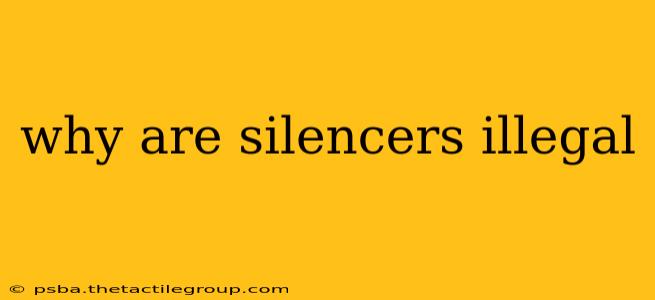Silencers, also known as suppressors, are devices that muffle the sound of a firearm. While often depicted in movies and television as making guns completely silent, this is a misconception. They significantly reduce the noise, but don't eliminate it entirely. The legality of silencers varies considerably across the globe, and even within countries like the United States, where laws surrounding them are complex and often debated. This article explores the reasons behind the illegality or strict regulation of silencers in many jurisdictions.
The Core Arguments Against Silencer Legality
The primary arguments against widespread silencer legality center around public safety and the potential for increased criminal activity. These concerns are often intertwined with public perception fueled by media portrayals.
1. Facilitating Criminal Activity: The Stealth Factor
One of the most significant concerns is that silencers make it easier for criminals to commit crimes undetected. The reduced sound signature allows for stealthier approaches, potentially leading to an increase in robberies, assassinations, and other violent crimes. The ability to commit crimes without attracting attention is a powerful argument used by those who oppose their legalization.
2. Increased Gun Violence and Escalation: The "Quiet Violence" Argument
Opponents argue that the quieter nature of suppressed firearms could lead to increased gun violence. The reduced noise might embolden perpetrators or make it easier to use firearms in public spaces without immediate detection, potentially escalating conflicts. This is often coupled with concerns about accidental shootings and the potential for misunderstandings in noisy environments.
3. Public Safety and Fear: The Psychological Impact
The presence of silencers contributes to a climate of fear and uncertainty. Even if the statistical impact on crime rates is debatable, the perception of increased danger caused by silent firearms can significantly impact public safety and overall well-being. The unsettling thought of undetected gunfire contributes to a sense of vulnerability, affecting community safety and social order.
The Counterarguments: Responsible Ownership and Practical Applications
While the concerns raised above are valid, proponents of silencer legalization often highlight responsible ownership and specific legitimate uses.
1. Hearing Protection for Law Enforcement and Sports Shooters: A Crucial Benefit
Silencers offer significant hearing protection, particularly beneficial for law enforcement officers during training and operations, and for sports shooters who engage in frequent shooting activities. The prolonged exposure to loud gunfire can lead to serious hearing damage, and silencers significantly mitigate this risk.
2. Reducing Noise Pollution: An Environmental Consideration
In some contexts, silencers can be employed to reduce overall noise pollution. This is particularly relevant in controlled shooting ranges and certain hunting situations. The environmental impact of excessive gunfire noise is a growing concern.
3. Self-Defense: A Controversial but Cited Argument
Some argue that silencers can be a valuable tool for self-defense, allowing for quieter and more discreet protection, especially in scenarios where loud noises could attract unwanted attention or escalate a situation. However, this argument is often met with skepticism due to the potential for misuse.
The Legal Landscape: A Patchwork of Regulations
The legality of silencers varies drastically across different jurisdictions. Some countries have outright bans, while others have stringent regulations requiring permits, background checks, and registration. Even within the United States, the regulations differ significantly between states. This inconsistent legal framework reflects the ongoing debate and the complexities of balancing public safety concerns with the legitimate needs of certain users.
Conclusion: A Complex and Ongoing Debate
The debate over silencer legality is far from settled. The concerns about public safety and potential misuse are substantial and must be carefully considered. However, the benefits in terms of hearing protection, reduced noise pollution, and specific legitimate uses also need to be acknowledged. Ultimately, a balanced approach that addresses both sides of the issue is crucial in crafting responsible and effective regulations. Future discussions will likely focus on stricter enforcement of existing laws, improved background checks, and a more nuanced understanding of the complex relationship between silencer ownership and public safety.

